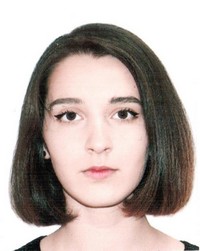Zakharova Anna Alekseevna
E-mail: Lisichka95@list.ru
Place of work: SBEI School No.1256
Post: teacher of supplementary education (the English language)
E-mail: Lisichka95@list.ru
Place of work: SBEI School No.1256
Post: teacher of supplementary education (the English language)
UDC 378.147 BBK 74.48
Pulyaevskaya A. M., Akopyan S. A.
The article considers the forms of electronic publications application for the organization of students’ self-study with texts. An overview of simple and accessible tools for creating books is offered.
Keywords: ebook; reading; Internet services; information technologies; children’s creative activity.
Download article in PDF (409.5 kB )
UDC 316.77:001.8 BBK 60.55.325.1:60.55.57с
This article deals with hermeneutic analysis of thrillers of English-speaking countries on the topic of schools and universities. It analyzes the structure and methods of narrative, books, articles, reviews of Russian and foreign film authors in the historical, ideological and socio-cultural context. In the process of hermeneutical analysis of thrillers of English-speaking countries, the author concludes that the content of films is not directly related to the main political events, however, it is impossible to deny the reflection of socio-cultural, economic, educational problems. Modeling of cinematographic images of teachers and schoolchildren/students has undergone significant modification depending on the specific historical stage. There is an expressive contrast in the conceptual base of thrillers in the different decades. In the 1970s – 1980s most of the thrillers about school and student’s life included the violence, cruelty, inhumanity, sexual attraction. In the following decades, these areas do not lose relevance, but rather acquire new colors. The thrillers about schoolchildren and students are devoid of intellectual discussions, they are immersed in a love theme, sexual relations and intrigues, closely intertwined with criminal & immoral behavior. At the same time, it can be noted that in general, the energy of students is mainly directed, on the one hand, to entertainment, recreation, romantic relationships and sex, and on the other, to physical and psychological violence, bloody crimes, brutal murders and massacres, etc. The educational process in these media texts plays a secondary role.
Key words: hermeneutic analysis, cinema, film, USA, UK, media text, teacher, students.
Download article in PDF (278.0 kB)
* Исследование выполнено за счёт финансовых средств гранта Российского научного фонда (РНФ, проект № 17-18-01001) в Ростовском государственном экономическом университете. Тема проекта: «Школа и вуз в зеркале советских, российских и западных аудиовизуальных медиатекстов». Руководитель проекта А. В. Федоров.
 E–mail: NLA20151@yandex.ru
E–mail: NLA20151@yandex.ru
Education: Federal State Budget Higher Education Institution «Irkutsk State University», Irkutsk, Russia
Status: Student
Main Scientific Fields: information technology in education, medialinguistics, phraseology in the cognitive aspect.
The most important publications:
UDC 37 BBK 74.202.5
The article analyzes the impact of the Internet on the student’s communicative competence. It is emphasized that communicative competence becomes the main one in the modern information society, its variable component composition is considered.
Keywords: Internet, world network, communicative competence of the student, variable component structure, thinking, knowledge, communication.
Download article in PDF (200.5 kB)
UDC 378.18 BBK 74.58
The article refers to the effective forms of educational work at a technical institution. The author sought to understand Aleksandr Ivanovich Dulov’s pedagogical views directed on the analysis of pedagogical and methodical efforts containing educational and moral aspects.
Key words: Aleksandr Ivanovich Dulov, educational work at a higher educational institution, students’ free time, work on professional orientation, patriotic work.
Download article in PDF (121.5 kB)
UDC 316.346.32-053.6 BBK 60.5
The article is presented the results of the research devoted to the study of senior high school students’ free time, its volume, content and structure.
Keywords: free time, young people, senior high school students, main forms of using free time, reading, internet, chat with friends.
Download article in PDF (123.6 kB)
UDC 37.022 BBK 74.03(2)
The article refers to the efficiency of methodological and methodical approaches developed by the Soviet pedagogical science, and in particular, the pedagogical experience of Aleksandr Ivanovich Dulov. The undoubted importance of A.I. Dulov’s theoretical and practical studies is in applying the structural method of presentation, on the example of pedagogics course, directed on the formation of a student’s competence and professionalism. The patterns of recommended sequence of activities developed by B. C. Badmaev are of interest.
Key words: Aleksandr Ivanovich Dulov, patterns in teaching of pedagogics, patterns of recommended sequence of activities in teaching of philosophy, students’ speaking activity.
Download article in PDF (193.6 kB)
E-mail: studic@yandex.ru
Place of work: Irkutsk Region Culture College, Irkutsk, Russia
Post: teacher, the work experience supervisor at Irkutsk Region Culture College
Scientific major: informatization of education, the formation features of individual’s communicative competence with the help of information and communication technologies
Important publications:
UDC 651.51 BBK 74.58
The article presents the results of studies of communication problems in professional activity and training specialists for it by the staff of the East Siberian Center of problems of pedagogical science and education. Considering scientific approaches to the research, essential characteristics of communication in professional activity, the author defines business and professional communication as well as communicative competence.
Keywords: scientific approaches; business communication; professional communication; communicative competence.
Скачать (109.9 kB)